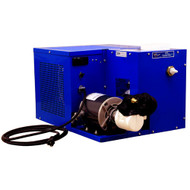The Significance of Glycol Chillers in Temperature Control and the Importance of Keeping Beer Cold
11th Apr 2024
In the realm of industrial and commercial applications, temperature control plays a pivotal role in ensuring the efficiency and quality of various processes and equipment. One key innovation in this field is the glycol chiller, a versatile cooling system that relies on a mixture of water and glycol to regulate temperatures.
A glycol chiller is a cooling system designed to maintain precise and consistent temperatures in a variety of applications. It accomplishes this by circulating a mixture of water and glycol, often propylene glycol, through a closed-loop system. This glycol-water solution serves as a highly effective heat transfer medium, capable of both cooling and heating processes. The flexibility of glycol chillers makes them indispensable in various industrial and commercial settings.
Glycol chillers are a cornerstone of breweries, bars & restaurants, where maintaining optimal temperatures during the transportation of beer from the walk-in cooler where it is stored in kegs to the point of dispense is vitally important. These chillers play a crucial role in cooling beer lines and dispensing equipment, ensuring a refreshing, consistent beer pour. It is vital that the beer is maintained at a constant, correct temperature while being dispensed, as a beer being poured at an improper temperature can affect everything from yield to taste.
Amid the many applications of glycol chillers, the importance of keeping beer cold when dispensing cannot be overstated. Here are some compelling reasons why this practice is essential:
- Flavor Preservation: Beer is a complex beverage with delicate flavors and aromas. Temperature greatly influences these characteristics. Dispensing beer at the right cold temperature helps preserve its intended taste profile. Warm beer can mute flavors and aromas, leading to a less enjoyable drinking experience.
- Consistency: Consistency is key in the brewing industry. Whether in a pub or at a brewery, customers expect each glass of beer to taste the same. Dispensing beer at a consistent cold temperature ensures that every pour is identical, meeting customer expectations and maintaining the brewer's reputation for quality.
- Carbonation Control: Cold temperatures help maintain the appropriate level of carbonation in beer. If beer is dispensed too warm, excess carbonation can be released, resulting in over-foaming and wastage. Keeping beer cold ensures proper carbonation levels, reducing waste and maximizing efficiency.
- Hygiene and Shelf Life: Cold temperatures inhibit the growth of unwanted microorganisms in beer lines and dispensing equipment. This not only ensures the cleanliness of the system but also extends the shelf life of the beer, reducing the risk of spoilage.
At Ultra Flow, our glycol chillers utilize a unique technology called a Cold Plate Heat Exchanger, as compared to the industry standard of a glycol reservoir. A cold plate heat exchanger can be more efficient than a bath of coolant in certain applications, especially when precise temperature control and efficient heat transfer are important - such as when pouring beer. Some advantages of cold plate heat exchangers are:
- Targeted Cooling: They can cool specific components or areas more effectively, reducing the risk of overheating.
- Efficient Heat Transfer: Cold plates are designed for efficient heat transfer between the plate and the component, often using good thermal conductive materials.
- Temperature Control: They offer better temperature control and stability compared to a large bath of coolant.
In conclusion, glycol chillers are versatile and indispensable cooling systems within the beverage industry, keeping beer cold when dispensing is of paramount importance. It preserves the beer's flavor, ensures consistency, controls carbonation, maintains hygiene, and prolongs shelf life. Glycol chillers, coupled with the practice of cold beer dispensing, contribute significantly to the enjoyment and quality of this beloved beverage. As such, they stand as a testament to the intersection of technology and tradition in the world of brewing.

